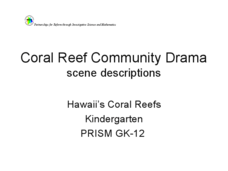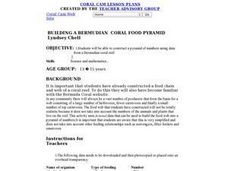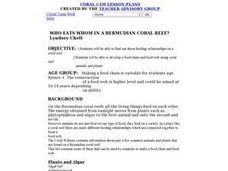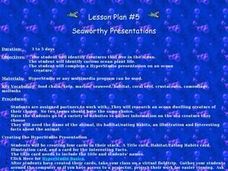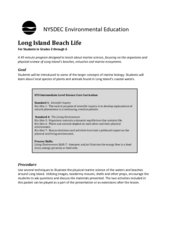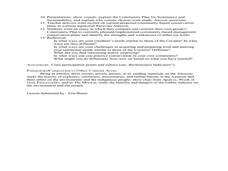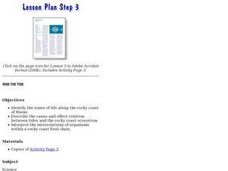Curated OER
Coral Reef Community
Students explore the coral reef. In this food chain lesson, students study the plants and animals of the coral reef and how they each play a role in that ecosystem. They participate in a class play to demonstrate the types of animals in...
Curated OER
Links in a Food Chain
Little ones make costumes and act out a rhyme in which there are daisies, bugs, wrens, snakes, and foxes that all interact in a food web. This would be a memorable activity for primary life scientists to participate in as a wrap-up...
Curated OER
Coral Reef Community Drama: Scene Description
Students are organized into groups and are assigned puppets according to what sea creature their group represents. In this reef lesson, students identify sea creatures according to their place in the food chain then discuss how these...
Curated OER
Dinnertime On The Reef
Middle schoolers identify the main parts of a coral reef. They describe a coral reef food chain.
Aquarium of the Pacific
Ecosystem Comparison
Fifth graders examine plants and animals in two ecosystems and compare them. In this ecosystem survival lesson, 5th graders compare and contrast a coral reef and kelp forest ecosystem. Students investigate the abiotic and biotic...
ARKive
Dinner at the Reef
Fine dining can happen anywhere, even in the coral reefs. Budding environmentalists explore marine food chains, predator-prey relationships and the importance of a balanced ecosystem. These important concepts are facilitated through a...
Curated OER
Coral Reefs Endangered
Students research where in the world coral reefs are located. In this ecology lesson, students create food chains and food web. They simulate growing coral reefs to understand their characteristics better.
Curated OER
Science: Coral Reef Food Pyramid
Young scholars construct numbers pyramids using fictional data from a coral reef. they tally the numbers of carnivores, herbivores, and producers. Students next build a pyramid shape in which they put their numbers of producers,...
Curated OER
Reef Sharks!
Pupils visit an ocean aquarium exhibit where they can observe Black tip reef sharks. They observe the shark's behavior and read any information exhibited on the walls. They complete a worksheet based on information collected.
Curated OER
Who Eats Whom in a Bermudian Coral Reef?
Students will be able to find out about feeding relationships on a coral reef. They then will be able to develop a food chain and food web using coral reef animals and plants using the Coral Website.
Curated OER
Food Chains and Webs
In this food chains worksheet, students identify the producers and consumers in the given food chains and describe how contaminants can biologically accumulate. This worksheet has 4 short answer questions.
Curated OER
Feeding in the Flow
The National Oceanic and Atmospheric Administration (NOAA) has developed a tremendous library of ocean-themed lessons that can be used in a variety of science settings. "Feeding in the Flow" is one of those activities; Its focus is on...
Curated OER
Saved by a Shark
Students explore the marine ecosystem and the importance of sharks. For this shark lesson, students look at photos of the Flower Garden Banks National Marine Sanctuary and discuss the animals that live there. They discuss which animals...
Curated OER
Biological Relationships - Coral Reef Memory Game and Chain Game
Students familiarize themselves with the interconnectedness of species within an ecosystem, and to use this knowledge to evaluate how the removal or decimation of one species can have far reaching effects.
Curated OER
Out of the Deep
Young scholars observe, describe, and record characteristics of ocean animals (mammals and fish) and sea shells. They conduct an experiment comparing and contrasting sugar water, salt water and fresh water and create a mural of coral...
Curated OER
Sea Connections
Students, after locating different marine habitats on a globe, play a card game about ecosystems, food webs and organisms.
Curated OER
Depending On Each Other. Communities And Ecosystems
Seventh graders investigate how the ecosystems of the world has influence upon the immediate and nonimmediate environments. The interelationships of food webs is discussed. The class researches one type of ecosystem for a class project...
Curated OER
Seaworthy Presentations
First graders research ocean animals and plants on the web. In this ocean habitat lesson plan, 1st graders prepare a multimedia presentation. Students will work on their presentations in pairs and every group should have its...
Curated OER
Long Island Beach Life
Have your class learn about marine life through this resource. This comprehensive lesson has learners discuss marine life, learn key vocabulary, discuss environmental concerns, and play games related to migration and predator/prey...
Curated OER
Supermarkets, Sustenance and Sustainability
Students investigate jungles and the people who depend upon them. In this sustainability lesson, students research wild life conservation and discover the importance of a jungle to Amazonian people. Students create a group...
Curated OER
Energy Flow in Ecosystems
Young scholars, in groups, create a slide show about the ecosystem and answer critical thinking questions based on their research.
Curated OER
Ride the Tide
Pupils examine the cause-and-effect relationship between tides and the rocky coast ecosystem. They complete a worksheet that illustrates the intertidal zone.
Curated OER
Camouflage, Protection, & Adaptations—Who am I?
Students explore ocean animal adaptations. For this animal adaptations lesson, students examine how different ocean animals use adaptations other than camouflage to protect themselves.




